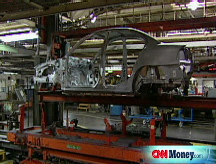Dems, Bush at odds over automaker bailout
Congressional Democrats seek portion of $700 billion bailout for auto industry, but White House skeptical.

WASHINGTON (CNN) -- A standoff between congressional Democrats and President Bush continued to brew Wednesday, as lawmakers pressed a skeptical administration to help ailing U.S. automakers.
Congressional Democrats want the Treasury Department to offer the troubled automakers loans from an unspecified portion of the $700 billion bailout package originally passed to help the financial industry, which is reeling from the global credit crisis.
The White House and congressional Republicans have not signed on to support such a move, however.
Disagreement over how to help automakers could result in a confrontation between congressional Democrats and the Bush administration just as Bush is preparing to leave office.
President-elect Barack Obama also voiced support for government aid to the automakers during his meeting with Bush on Monday. The controversy could pull him into the center of the political fray even before he formally takes the reins.
On Tuesday, House Speaker Nancy Pelosi said she would be willing to call Congress back for a lame-duck session as early as next week to pass legislation that would divert some of the $700 billion to the automakers if the administration failed to act.
But the Bush administration's point man on the economy, Treasury Secretary Henry Paulson, Wednesday suggested that the bailout plan - dubbed the Troubled Asset Relief Program, or TARP - may not be the best way to help the troubled automakers.
"We care about our auto industry in the U.S. They're a key part of our manufacturing industry. Manufacturing is critical. ... We need a solution," Paulson said. "But the solution has got to be one that leads to viability, and ... the intent of the TARP was to deal with the financial industry."
White House spokesman Tony Fratto reacted skeptically to Pelosi's proposal.
"We'll have to see what Speaker Pelosi is proposing. There are no details, so there's nothing to react to," Fratto said in a statement on Tuesday. "If Congress wants to change the law, we'll see how they intend to do it. Of course, it's strange that congressional Democrats would choose to ignore the $25 billion program they actually created to assist the automakers; that would be a better place to start."
Advocates for the automakers argue the government must act now if it is to save the domestic auto industry, as the Big Three automakers - General Motors (GM, Fortune 500), Ford (F, Fortune 500) and Chrysler - continue to report bad news.
On Tuesday, General Motors stock continued to slide downward, reaching $2.92 a share, the lowest it has closed since April 1943. The company has also laid off 5,600 employees in less than a week.
And last week Ford announced that it has lost $3 billion dollars in the third quarter and was also planning to reduce its salaried and hourly workforce.
Rep. Sander Levin, D-Michigan, argued that the government cannot wait until Obama takes office to shore up the industry, noting that a failure of the automobile industry would "ricochet" throughout the economy.
"There's an urgency here, and it can't wait for an Obama administration," Levin said. "The president-elect has said that the auto industry is the backbone of manufacturing in this country, and we have to make sure that backbone isn't splintered in the next couple of months, before there is a new administration."
But the White House and congressional Republicans have expressed doubts about the government throwing a lifeline to the auto industry.
"Automakers today, airlines tomorrow. Where do you stop?" a Senate Republican leadership aide asked.
CNN's Scott J. Anderson, Ed Henry, Candy Crowley and Jessica Yellin contributed to this report. ![]()


